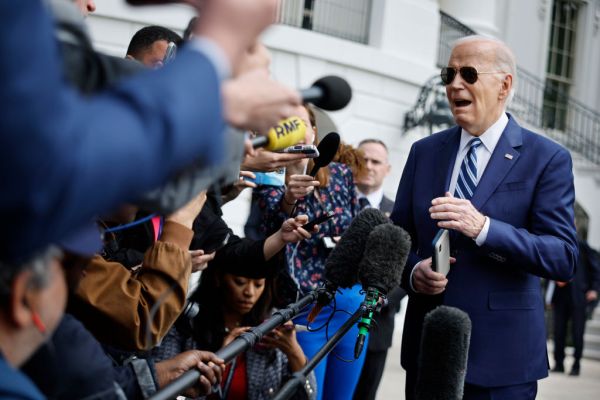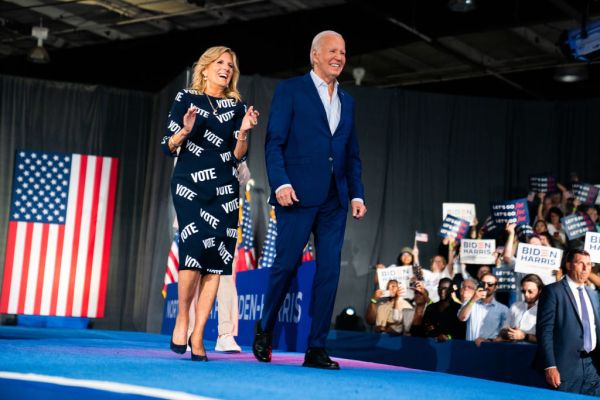Of the top three presidential contenders, the most mentally stable option is a guy who’s spent years discouraging vaccination, who refuses to “take sides on 9/11,” and who says he was once diagnosed with a worm in his brain.
He’s running a distant third.
As others have noted, the point of political parties ostensibly is to elevate competent candidates who can win elections and then implement an ideological agenda. What our two major parties have given us instead this year is a choice between mental defectives.
And remarkably, the establishment of each one seems okay with it.
The institutional GOP has spent nine years being assimilated into Donald Trump’s cult of personality, so its enthusiasm for him at this point might be genuine. But it wasn’t that way in 2016. Voters spent that summer and fall watching one Washington Republican after another make the case for Trump through visibly gritted teeth. The leaders of a major political party undertook to elect a candidate whom they plainly believed was unfit for office. Never before in my lifetime had that happened in American politics.
Now, in 2024, it’s happening again.
Democrats in the House and Senate met today to discuss what to do about Joe Biden, but the plan was already clear beforehand: nothing. Notable figures inside and outside Congress have already begun to retreat from their demands that the president withdraw from the race. He won’t do so and he can’t be pushed out, so there’s nothing to be gained by trying except to divide the left with Election Day bearing down. The Democratic hostage crisis will end the same way the Republican version did—with the total capitulation of tribal partisans.
Institutionally, the Democratic Party plainly believes Biden is no longer fit for office. But rather than tell the truth, in the interest of victory Democrats are going to lie to voters’ faces about it like their Republican counterparts did eight years ago.
“Authoritarianism and Donald Trump aren’t the only threats our democracy faces,” Jon Stewart warned his audience on Monday night. “An arthritic status quo unable or unwilling to respond in any way to the concerns of voters who just received new and urgent information about their candidate also erodes confidence and faith in the system of government.”
A system that dispenses with any pretense of caring about whether its leaders are fit for office is a system that won’t endure. It will drown in cynicism.
In fact, a case can be made that the Democratic establishment is behaving more cynically today than Republicans did in 2016.
Like the Republicans before them, Democrats have two momentous political problems. And like the Republicans before them, the essence of their cynicism is that they’ve chosen to focus entirely on one to the exclusion of the other.
Problem one: Can our candidate win this election? Problem two: Should our candidate win this election if we doubt his ability to govern responsibly?
One problem is electoral, the other is ethical. If you care immensely about the first and not at all about the second, you’re an accomplice to the sort of disaffection Stewart described. Which is ironic, because widespread disaffection about democratic outcomes is very helpful long-term to the forces arrayed against Democrats on the other side of the ballot this year.
In 2016, establishment Republicans had a compelling excuse for rallying behind Trump. Their voters had chosen him in a primary, freely and fairly. For GOP leaders, that was enough.
You can hate the primary system (and should!), but if a party resolves to outsource its nominating process to its members then it’s institutionally bound to support whom they choose. The most one can say to delegitimize Trump’s primary victory in 2016 is that it came before the Access Hollywood tape emerged, but Trump had already made numerous offensive comments during that race that did him no harm. Republicans wanted a boorish alpha-male oaf oozing bravado as their champion and that’s what they got. If anything, the tape affirmed that Trump was who they presumed him to be.
Republicans were under no illusions about Trump when they chose him. But Democratic voters were under an illusion about Joe Biden when they chose him this past spring—and that illusion may well have been maintained with help from some of the people now arguing that the president should remain the nominee.
On Monday the Wall Street Journal reported that senior advisers have been aggressively managing Biden’s movements “for more than a year” to try to hide the extent of his decline. One source remembered the president struggling to recall the word “veteran” at a fundraiser in June 2023. As early as June 2022, during a summit overseas, German diplomats were aware that Biden grew fatigued in the evening and moved up a scheduled meeting by a few hours to accommodate him. He missed the meeting anyway; allegedly, Secretary of State Antony Blinken attended in his place and told the Germans that the president “had to go to bed,” a claim the State Department denies.
If all of this has been going on “for more than a year” at least, why wasn’t it disclosed to Democratic primary voters before they began casting ballots? And given that it wasn’t, by what logic are Democratic leaders duty-bound to ratify the fraud that’s been perpetrated in the name of “respecting the will of the voters”?
How many of those leaders knew the truth about Biden’s condition and conspired in the cover-up themselves, only to now demand that angry liberals “get in line” because it’s too late to replace him?
The president’s physician revealed Monday that an expert on Parkinson’s disease visited the White House eight times in eight months starting last summer. It’s not what you think, he went on to imply, suggesting that the visits were part of “regular neurology clinics” for all White House employees rather than treatment sessions for Biden himself. But I don’t believe him. At this point, why would I?
We know that the truth about the president’s condition was suppressed for months or years. There’s no reason to assume that suppression ended after the debate, especially once Biden insisted on staying in the race.
There’s also no reason to think that the voters of his party who renominated him still believe he can govern responsibly in a second term. A recent New York Times poll found 59 percent of Democrats now view him as too old for the job, up 8 points since before the debate. “In several post-debate polls, the percentage of Democrats who say that Biden should still be the nominee, that he should not drop out, or that the party has a better chance with him than with an alternative nominee has fallen below 50 percent,” Will Saletan noted in a piece today at The Bulwark.
In 2016, establishment Republicans could honestly say that their party’s primary voters had foisted Donald Trump on them. For Democrats in 2024, it’s the other way around: A conspiracy of silence around Joe Biden, orchestrated at the highest levels, deceived primary voters into believing that he was both fit to govern and remained their best hope for holding the presidency.
The motives of everyone involved in this travesty are now under suspicion.
“The main conclusion I’ve come to over the past two weeks is that Democrats are apparently not actually that scared of a second Trump term,” Meghan McCain tweeted on Tuesday, marveling at the party’s willingness to stick with a very likely electoral loser.
Is she wrong?
“If Biden holds on because his fellow Democrats refuse to speak up, I am going to have serious doubts as to whether they simply miscalculated or whether they decided to save their own skins at the expense of their country,” Jonathan Chait wrote at New York magazine, echoing McCain’s point. The more Biden digs in, after all, the riskier it becomes for congressional Democrats to oppose him: At some point, if the president won’t budge, continuing to question his fitness will accomplish nothing except to sow doubt about him among swing voters.
Forced to choose between demanding the strongest possible nominee in hopes of saving classical liberalism from Trump or quietly lining up behind Biden and all but certain defeat, many Democrats seem to prefer the second option—because at least then they won’t be scapegoated by the base for undermining the president’s campaign. They’d rather keep their own seats in the House and Senate than risk losing them for the sake of maximizing the odds of defeating authoritarianism.
Saving democracy isn’t their highest priority, it appears.
The strange spectacle of far-left progressives rallying to Biden’s defense has also raised suspicion about motives. “The matter is closed,” Alexandria Ocasio-Cortez told reporters on Monday. “Joe Biden is our nominee. He is not leaving this race. He is in this race, and I support him.” Fellow Squadster Ilhan Omar—who has described the Biden-backed Israeli effort in Gaza as a genocide—also lent the beleaguered president her support.
Why? Are they really just loyal Democratic partisans after all, or do they see certain benefits to progressivism in a Biden defeat? If the president runs and loses, the left can argue that he would have prevailed with a more left-wing agenda. More importantly, their movement will profit from the radical polarization brought about by a second Trump administration. For someone whose goal is to convert normie liberals into socialists, there’s nothing like having a right-wing authoritarian in power to help heighten the contradictions.
Anywhere you look in this fracas, doubts about the cynical motives of the players involved bubble up. Why is it, for instance, that top-tier 2028 hopefuls like Gretchen Whitmer are scrambling to get out of the president’s way? Is it because they’re desperate to unify the party behind him against Trump—or is it because they’d rather have a nominee who can’t run again in the next cycle, as President Kamala Harris could and would?
Why is it that some of the president’s African American allies have stooped to such groan-inducing demagoguery in warning his critics to back off? Is it because they sincerely view him as the party’s only hope against Trump, or because they’re keen to remind the wider party that black leaders are, and will remain, power brokers in the Democratic Party going forward?
And what about the media’s motives? Where do they go from here?
If they continue to report evidence of Biden’s infirmity between now and Election Day the American left will accuse them of trying to engineer a Trump restoration, knowing how good that will be for the news industry’s bottom line. If they don’t continue to report out evidence of Biden’s infirmity the American right will accuse them of suppressing newsworthy information in hopes of dragging a Democratic candidate to victory.
Both critiques will have some merit, frankly. Why should we assume that the media is operating in good faith when everyone else’s motives in this orgy of cynicism are in doubt?
Still, if we’re looking for an act of cynicism that assured Democrats would end up in this predicament, we need to go way back before even the cover-up of Biden’s decline began.
Kamala Harris is an unsympathetic figure and the author of most of her own political misfortune, as anyone who’s watched her try to turn a phrase knows well. But this much is true: An administration led by the oldest president in American history, who might plausibly keel over at any moment, has done shockingly little to try to build public confidence in the person who would inherit the job if he does.
Not only have they done next to nothing to build up Harris, in fact, they’ve burdened her with tasks that seemed doomed from the jump to sink perceptions of her competence. Former Rep. Tim Ryan complained about it in a recent interview with The Atlantic, wondering why the White House saddled her with a portfolio as thankless as stabilizing the border. “You send her to do immigration, but then aren’t willing to do anything on it,” Ryan said of Biden. Why would the White House put her in that position?
Until the debate I would have answered “Because they’re incompetent.” But now, drowning in cynicism, I wonder if that wasn’t a deliberate strategic choice by Team Joe. The more hapless Harris was made to seem, the less pressure there would be on Biden from the party to stand aside in 2024 and make way for her as the nominee.
Biden and his top cronies continue to undermine her to this day, despite the considerable chance that she’ll end up topping the ticket. “Who else do you think can step in here and do this?” the president asked the hosts of Morning Joe during an interview on Monday, obviously intending it to be a rhetorical question. When The Atlantic pressed his chief of staff, Jeff Zients, to name a moment when Biden had leaned on Harris for guidance, Zients mentioned making “equity” a priority of the administration and promised to get back in touch with additional examples. He never did.
For the president to maintain his hold on the party and therefore on power, his vice president had to be seen as someone in whom no Democrat would reasonably place their confidence. That strategy appears to have worked splendidly for them.
Enough so, perhaps, to render this election unwinnable no matter who the nominee ends up being.
Which leaves us with the other momentous political problem Democrats face. Laying aside whether Joe Biden will be fit to govern next year, is he still their best bet to defeat Trump? Or would Harris, warts and all, stand a better chance at this point?
I think it’s this simple: They’re both weak and probably unelectable, partly thanks to the White House’s “no confidence” approach to the VP. But Harris at least has some hypothetical upside; Biden no longer has any.
Some polls already show her marginally outperforming the president. An average of recent surveys conducted by CNN and Ipsos has her leading Trump by 5 points among independents while Biden trails the Republican by 4 among the same group. FiveThirtyEight’s model gives her ever so slightly better odds of winning than it does her boss, estimating that she’d win more popular votes nationally than Biden yet suffer by comparison to him in key states like Pennsylvania and Wisconsin.
She’ll probably lose. But if you squint, you can see how she ends up giving Trump a run for his money.
Upon replacing Biden as nominee, she’d benefit from an initial burst of goodwill among the anti-Trump coalition. The enormous, insuperable burden of his age and diminution would be off their shoulders; they’d have received a new lease on political life at a moment when a second Trump term seemed inevitable. Swing voters would be free again to focus on the other extremely old mental defective in the race. It’d be a shot in the arm.
Harris would need to create a simulacrum of a thoughtful and impressive politician for all of four months. To broaden her appeal and assure centrists that she won’t veer too far left, she might be paired with a southern governor like Andy Beshear or Roy Cooper on the ticket. Her gender might make her a more compelling messenger than Biden on the issue of abortion, goosing Democratic turnout.
If she performed well for 120 days or so, she could plausibly turn the race into something approximating a coin flip by Election Day.
Biden can’t. Already some of his polling has turned dire in battlegrounds, where he continues to run far behind Democratic Senate candidates. He’s now 3.3 points behind Trump in the RealClearPolitics national average, his largest deficit since January. There’s no reason to think he can turn that around. “Time is an arrow,” The Atlantic’s Derek Thompson wrote of the president’s problem. “All efforts to reduce the salience of Biden’s age ironically do the opposite: Keeping him away from reporters raises questions, and putting him on camera creates moments.”
It won’t get better. It will probably get worse, potentially catastrophically.
But as I write this, it appears Democrats will insist on going forward anyway with a nominee who’s strongly favored to lose a “Who’s less fit?” contest to the most grotesquely unfit president in American history. It would be one thing if Biden had dazzled party leaders by showing them his mettle after his dismal debate performance, but the truth is actually the opposite. They called on him to prove he was up to the job; he did nothing. Then they rolled over anyway when he bullied them. “Biden’s focus has been on silencing concerns rather than answering concerns,” Obama speechwriter Jon Lovett observed succinctly. Instead of punishing him for it, Democrats are rewarding him.
We’re all cynics now.










Please note that we at The Dispatch hold ourselves, our work, and our commenters to a higher standard than other places on the internet. We welcome comments that foster genuine debate or discussion—including comments critical of us or our work—but responses that include ad hominem attacks on fellow Dispatch members or are intended to stoke fear and anger may be moderated.
With your membership, you only have the ability to comment on The Morning Dispatch articles. Consider upgrading to join the conversation everywhere.